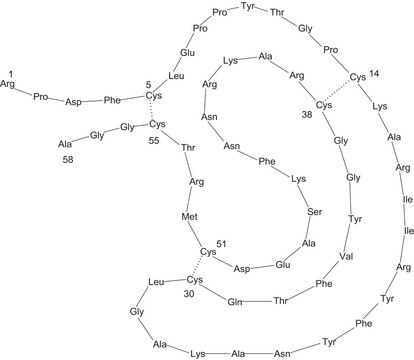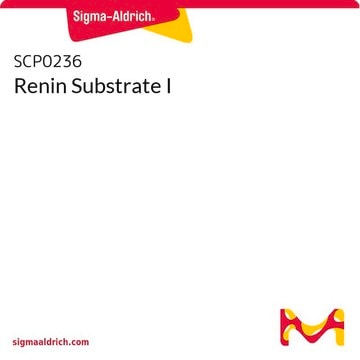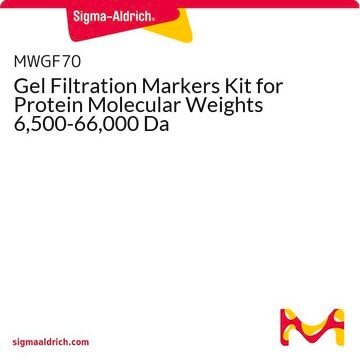Y0001154
Aprotinin for system suitability
European Pharmacopoeia (EP) Reference Standard
Synonyme(s) :
Aprotinin
Se connecterpour consulter vos tarifs contractuels et ceux de votre entreprise/organisme
About This Item
Produits recommandés
Qualité
pharmaceutical primary standard
Famille d'API
aprotinin
Fabricant/nom de marque
EDQM
Application(s)
pharmaceutical (small molecule)
Format
neat
Température de stockage
2-8°C
Description générale
This product is provided as delivered and specified by the issuing Pharmacopoeia. All information provided in support of this product, including SDS and any product information leaflets have been developed and issued under the Authority of the issuing Pharmacopoeia.For further information and support please go to the website of the issuing Pharmacopoeia.
Application
Aprotinin for system suitability EP Reference standard, intended for use in laboratory tests only as specifically prescribed in the European Pharmacopoeia.
Conditionnement
The product is delivered as supplied by the issuing Pharmacopoeia. For the current unit quantity, please visit the EDQM reference substance catalogue.
Autres remarques
Sales restrictions may apply.
Produit(s) apparenté(s)
Réf. du produit
Description
Tarif
Code de la classe de stockage
11 - Combustible Solids
Classe de danger pour l'eau (WGK)
WGK 1
Point d'éclair (°F)
Not applicable
Point d'éclair (°C)
Not applicable
Choose from one of the most recent versions:
Certificats d'analyse (COA)
Lot/Batch Number
Sorry, we don't have COAs for this product available online at this time.
If you need assistance, please contact Service Clients
Déjà en possession de ce produit ?
Retrouvez la documentation relative aux produits que vous avez récemment achetés dans la Bibliothèque de documents.
Les clients ont également consulté
Ulrich Weininger et al.
Biochemistry, 53(28), 4519-4525 (2014-07-02)
Intramolecular motions of proteins are critical for biological function. Transient structural fluctuations underlie a wide range of processes, including enzyme catalysis, ligand binding to buried sites, and generic protein motions, such as 180° rotation of aromatic side chains in the
Regulatory decisions pertaining to aprotinin may be putting patients at risk.
Paul C Hébert et al.
CMAJ : Canadian Medical Association journal = journal de l'Association medicale canadienne, 186(18), 1379-1386 (2014-10-01)
Philippe Leroux et al.
Journal of neuropathology and experimental neurology, 73(5), 387-402 (2014-04-09)
Intracerebral-intraventricular hemorrhages (ICH/IVH) in very preterm neonates are responsible for high mortality and subsequent disabilities. In humans, tissue plasminogen activator (t-PA) initiates fibrinolysis and activates endoluminal-endothelial receptors; dysfunction of the t-PA inhibitor (PAI-1) results in recurrent hemorrhages. We used PAI-1
D Royston
Anaesthesia, 70 Suppl 1, 46-49 (2014-12-03)
There is a considerable difference between the mechanism of action of the lysine analogues, tranexamic acid and epsilon-aminocaproic acid, and the serine protease inhibitor aprotinin. Aprotinin acts to inactivate free plasmin, but with little effect on bound plasmin, whereas the
Reduction in serine protease activity correlates with improved rosacea severity in a small, randomized pilot study of a topical serine protease inhibitor.
Aimee M Two et al.
The Journal of investigative dermatology, 134(4), 1143-1145 (2013-11-12)
Notre équipe de scientifiques dispose d'une expérience dans tous les secteurs de la recherche, notamment en sciences de la vie, science des matériaux, synthèse chimique, chromatographie, analyse et dans de nombreux autres domaines..
Contacter notre Service technique











